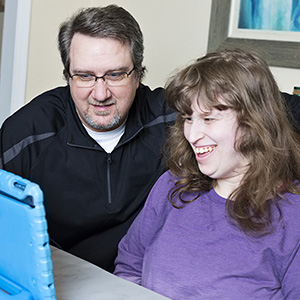
Maine Assessing Services Agency (ASA) Support
We manage Maine's Statewide Assessment Services Agency, which is an integrated service for assisting individuals across a range of support programs, including Long Term Care (LTC), Acquired Brain Injury (ABI), and Intermediate Care Facilities (ICF), among others.
Learn more about the ME ASA program

Maine Acquired Brain Injury (ABI)
Acquired Brain Injury (ABI) is an injury to the brain that results from trauma, infection, vascular lesions, or anoxia. It can result in physical, behavioral or mental dysfunction affecting an individual’s ability to function independently. This evaluation requires a neuropsychologist evaluation and completion of the Mayo Portland Adaptability Inventory and Health and Safety tool to determine medical eligibility for specialized ABI services eith in the facility setting or at home.
Learn more about ME ABI

Maine Intermediate Care Facilities (ICF) and Intellectual/Developmental Disabilities (IDD)
Intermediate Care Facilities (ICF) are specialized facilities for Individuals with Intellectual/Developmental Disabilities (IDD), or other related conditions, who require care and services above the level of room and board but not that of a hospital or skilled nursing facility. Medical eligibility requires a physician certification that the person have a need for at least 8 hours of licensed nurse supervision per day. The focus of these facilities is to assist individuals to reach their maximal level of functioning capabilities, with healthcare and rehab services while providing 24 hour care.

Maine Long-Term Care (LTC) Advisory
The Long-Term Care (LTC) Advisory is an assessment that provides advice to the individual and family/guardian to determine if the person is eligible for possible facility admission, or in-home services funded through MaineCare or state funded home-based care programs. Individuals choosing to enter a nursing facility must have this type of assessment to comply with the State statutes unless entering under skilled care.
Learn more about ME LTC

Maine Other Related Conditions (ORC)
Other Related Conditions (ORC) constitute Cerebral Palsy, Epilepsy, or other condition besides mental illness which found to be closely related to Intellectual Disability, resulting in impairment or general intellectual functioning or adaptive behavior, similar to that of persons with Intellectual Disabilities and requires similar treatment or services.
The State of Maine requires a Medical Eligibility Determination assessment and completion of the BMS 99 to determine an individual’s medical eligibility for services under the Other Related Conditions Waiver. The program provides community integration through existing natural supports and community relationships, such as Care Coordination, Home Support, Community Support, and Work Support.
Learn more about ME OTC

Maine Preadmission Screening and Resident Review (PASRR)
We perform onsite evaluations for individuals suspected of having a mental illness, through the Preadmission Screening and Resident Review (PASRR) program.
The primary goal of this federally mandated assessment is to determine whether the nursing home is the appropriate placement for individuals with mental illness, intellectual disabilities or developmental disabilities. PASRR also works as a critical function to help match individuals with the care and services they need.
Learn more about the ME PASRR program

Maine Supports Intensity Scale (SIS®)
Maximus has been contracted to partner with the State of Maine Department of Health and Human Services – Office of Aging and Disability Services (OADS) to administer the Supports Intensity Scale for Adults (SIS-A) Assessments. This comprehensive planning tool measures exceptional medical and behavioral needs, as well as the areas of home living, community living, health and safety, lifelong learning, work activities, social activities, and advocacy.
Learn more about the ME SIS-A program

